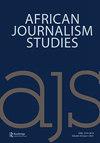通过社交媒体民族志和滚动访谈研究澳大利亚的非洲青年
IF 1.8
3区 文学
Q3 COMMUNICATION
引用次数: 4
摘要
本文对两种重叠的研究方法——社交媒体民族志和“滚动访谈”进行了反思性分析,这两种方法被用来研究年轻的第一代和第二代a。。。本文章由计算机程序翻译,如有差异,请以英文原文为准。
Researching Connected African Youth in Australia through Social Media Ethnography and Scroll-Back Interviews
This article is a reflexive analysis of two overlapping research methods, social media ethnography and “scroll-back interviews”, that were employed to study how young first- and second-generation A...
求助全文
通过发布文献求助,成功后即可免费获取论文全文。
去求助
来源期刊

African Journalism Studies
COMMUNICATION-
CiteScore
1.90
自引率
10.00%
发文量
18
期刊介绍:
Accredited by the South African Department of Higher Education and Training for university research purposes African Journalism Studies subscribes to the Code of Best Practice for Peer Reviewed Scholarly Journals of the Academy of Science of South Africa. African Journalism Studies ( AJS) aims to contribute to the ongoing extension of the theories, methodologies and empirical data to under-researched areas of knowledge production, through its emphasis on African journalism studies within a broader, comparative perspective of the Global South. AJS strives for theoretical diversity and methodological inclusivity, by developing theoretical approaches and making critical interventions in global scholarly debates. The journal''s comparative and interdisciplinary approach is informed by the related fields of cultural and media studies, communication studies, African studies, politics, and sociology. The field of journalism studies is understood broadly, as including the practices, norms, value systems, frameworks of representation, audiences, platforms, industries, theories and power relations that relate to the production, consumption and study of journalism. A wide definition of journalism is used, which extends beyond news and current affairs to include digital and social media, documentary film and narrative non-fiction.
 求助内容:
求助内容: 应助结果提醒方式:
应助结果提醒方式:


